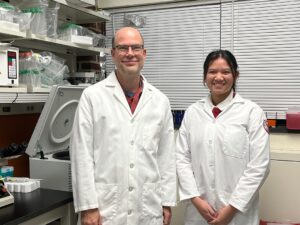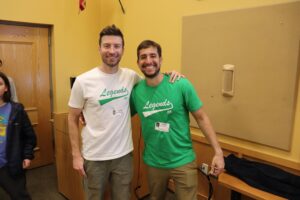
Keishanne Bernal, a senior at Westlake High School in Thornwood, New York, is now a published author of her first scientific study, as a result of the mentorship of Christopher Whitehurst, Ph.D., assistant professor of pathology, microbiology, and immunology, and of biochemistry and molecular biology at New York Medical College (NYMC). The study, which was conducted at NYMC last summer and published in Virus Research in September 2023, explores the increased incidence of Epstein-Barr Virus (EBV) reactivation in COVID-19 patients.
“I was already interested in virology due to the COVID-19 pandemic but when I learned more about the research on EBV that Dr. Whitehurst’s lab works on and EBV’s possible relationship to Long COVID, it really drove it home for me,” said Bernal, who sought out research with Dr. Whitehurst as part of a science research course offered at Westlake High School.
“From our earliest meetings, Dr. Whitehurst expressed interest in helping me get published but it wasn’t until after we conducted the research, and I was writing up my paper in preparation for science fairs that I realized that a publication was possible,” said Bernal, who has a particular interest in pharmacology and plans to pursue a career working as a scientist in the medical field developing treatments for diseases. “When I got the email that we were accepted for publication, it felt unreal to me. Seeing my paper actually published on the journal’s website where I would read and cite other science journals brought tears to my eyes. I am extremely grateful to Dr. Whitehurst for his hands-on support and guidance as a mentor that helped me achieve this.”
One of nine known human herpes viruses, EBV infects more than 90 percent of the world’s population. While primary EBV infections are usually asymptomatic and mild in children, after adolescence, EBV commonly causes infectious mononucleosis and is also associated with several forms of cancer. When symptoms are resolved, EBV also remains latent in the body for a lifetime and can be reactivated by prolonged psychological stress, hormonal changes, infections and other factors that result in weakened immunity, including COVID-19.
The study at NYMC used samples collected when the Omicron variant was the dominant strain of COVID-19 in the area to determine if COVID-19 infection promoted EBV reactivation.
“Reactivation of EBV has been reported among the critically ill and in patients suffering from Long COVID and this reactivation is associated with complicating symptoms, including autoimmune disease, chronic fatigue syndrome, and various other malignancies,” said Dr. Whitehurst. “Our results suggest that infection with COVID-19 did reactivate EBV at a higher rate than for non-COVID patients, findings that can help guide treatment for COVID patients in the future.”
This past summer, Keishanne returned to NYMC to continue her research with Dr. Whitehurst, this time working to identify small molecule inhibitors of EBV.
“Our goal was to find an inhibitor for EBV’s enzyme BPLF1,” said Bernal. “For the study, I used software to generate a predictive model of how certain compounds would appear if binded to the BPLF1 enzyme. I was able to choose the inhibitors that appeared to have good binding to BPLF1’s active site and then test their efficacy through various infectious assays.”
“I’ve enjoyed having Keishanne in the lab,” said Dr. Whitehurst. “She is very intelligent, detail-oriented, and extremely hard-working. She accomplished so much during her time here and I am excited to see her scientific journey continue.”






